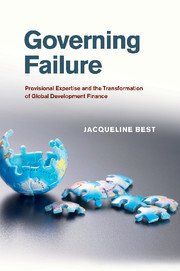‘Supremely over-confident in the 1980s and 1990s, international financial institutions have now recognized some of the limits of their capacity to effect change in an uncertain world. But, if structural adjustment has failed, what comes afterwards? In a brilliant analysis, Jacqueline Best shows us how the IFIs have invented a new form of ‘provisional governance’: failure is now anticipated, the authority of experts is known to be fragile, and government has become something of an experiment.’
Andrew Barry - University College London
‘Governing Failure is a fascinating exploration of the dynamics of expertise, authority, and power in international development institutions and the paradoxes that result. Expertise generates authority, which is undermined by perceived failure resulting from contingency. Governance therefore becomes more provisional, but if it is cautious rather than experimental it ultimately jeopardizes the authority upon which these institutions rely.’
Robert O. Keohane - Woodrow Wilson School of Public and International Affairs, Princeton University
‘Drawing on a highly creative and wide-ranging engagement with theory and extensive empirical research, this wonderful new book by Jacqueline Best makes a major contribution to our understanding of how the IMF and World Bank have changed since the structural adjustment era and to theorizing global governance more generally.’
Tony Porter - McMaster University, Canada
‘Best offers a much needed theoretical account of how and why there has been a move to ‘govern failure’ within international organizations. Along the way, Best gives us a powerful framework for understanding the dynamics of global governance in general, and the role of international organizations in particular.’
Ole Jacob Sending - Director of Research, Norwegian Institute of International Affairs (NUPI)



